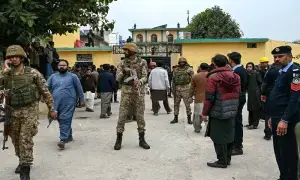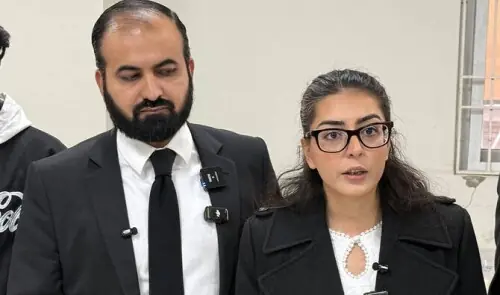The Peshawar High Court (PHC) on Thursday commuted the death sentence awarded to the primary accused in the 2017 lynching of university student Mashal Khan, but maintained the convictions and jail terms handed down to 32 others.
A two-member bench, comprising Justice Lal Jan Khattak and Justice Syed Attique Shah, announced the verdict through a short order. The bench had reserved its verdict on September 29 after conducting marathon hearings for seven days in dozens of appeals field by the Khyber Pakhtunkhwa government, Mashal’s father Mohammad Iqbal Khan and 33 of the convicts.
Mashal Khan, a 23-year-old student of the Department of Mass Communication at the Abdul Wali Khan University, Mardan, was lynched by a mob and shot over allegations of blasphemy on April 13, 2017.
Multiple appeals were filed by the KP government and Mashal's father seeking reversal of the acquittal of 28 of the accused and an increase in the sentences of 25 of the convicts who were awarded three years' imprisonment, and those of seven others who were handed down life imprisonment.
See: Mashal Khan: Lighting a flame in our hearts by losing his life
Similarly, appeals were filed by convict Imran Ali, who had opened fire on Mashal and was sentenced to death by the trial court; seven convicts who were awarded life imprisonment; and 25 others who were sentenced to three-year jail terms.
On Thursday, the PHC only granted the appeal filed by convict Imran, converting his death sentence into life imprisonment. The court dismissed all other appeals, maintaining the life sentences and jail terms awarded to the 32 other convicts.
The court also cancelled the bails granted to 25 convicts who were handed down three-year jail terms and ordered police to arrest them. Police subsequently arrested eight of the convicts who were present in the courtroom and shifted them to jail.
Mashal's father said he will challenge the PHC verdict in the Supreme Court after consulting his lawyers.
"My Mashal Khan cannot return but I am struggling for justice," he told media representatives.
Analyse: Mashal's death is a result of the regression of our student politics
ATC convictions
Mashal's lynching took place within the premises of his university and was caught on video which later circulated on social media. The horrific incident shocked the nation and sparked a debate over the misuse of the blasphemy laws in Pakistan. In June 2017, a 13-member joint investigation team (JIT) concluded in its report that the allegations of blasphemy against Mashal were unfounded and were used as a pretext to incite a mob against the slain student.
On February 7, 2018, an anti-terrorism court (ATC) convicted 31 of the 57 accused who had initially faced trial in the lynching case, awarding death sentence to prime accused Imran, life imprisonment to five of them, and three years' imprisonment to 25 others.
The court, which had conducted the trial inside the Haripur Central Prison, acquitted 26 of the accused men, ruling that the prosecution had failed to prove charges against them.
It had also issued perpetual warrants for the arrest of four of the absconding accused, including Arif Khan, who was a tehsil councillor of the Pakistan Tehreek-i-Insaf; Asad Zia alias Asad Katlang, an office assistant at the university; and students Izharullah alias Joni and Sabirullah alias Sabir Mayar.
The absconders were later arrested and tried by another ATC in Peshawar.
Following the trial, the court on March 21, 2019, convicted Arif and Asad and sentenced them on multiple counts to life imprisonment and Rs300,000 fine each. The two other accused were acquitted.

































